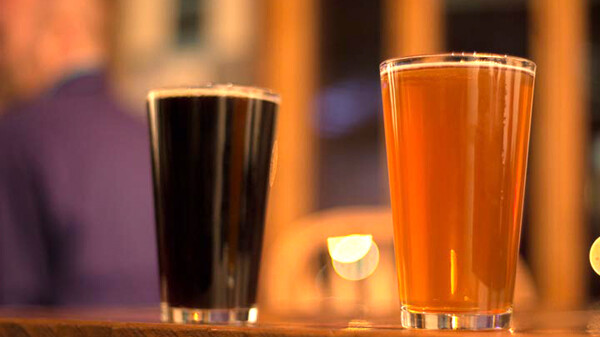Bozeman Brewers Voice Concerns and Hopes for Future Industry Reform
Joy Dale, photos by Jenny Barth | Tuesday Mar. 3rd, 2015

Possible chances for brewing industry reform during the Montana legislative session came to a standstill this February when the House of Representatives’ Business and Labor Committee tabled two competing beer bills (House Bill 326 and House Bill 336). Despite this outcome, many Bozeman brewers continue to work toward reform of the brewing industry laws in Montana, each focusing on different aspects of the industry.
HB 326 would have allowed a practice called license-stacking in which a single business owner could have purchased multiple licenses; allowing a brewery owner to purchase a retail license and offer the same amenities as a full bar. Tavern owners could also purchase a brewery license and operate a brewery within their bar. In addition, HB 326 also would have allowed breweries producing between 10,000 and 60,000 barrels to continue to sell beer for on-premise consumption so long as on-premise sales did not exceed 500bbls. Named “Montana Brewery Act”, this bill was the product of cooperation between two organizations which, in the past, have been unwilling to work together: the Montana Brewers Association and the Montana Tavern Association.
In opposition to HB 326, Montana Beer and Wine Distributors Association (MBWDA) along with some Montana breweries joined together calling themselves the “Coalition for Beer Fairness” and proposed an alternative, HB 336 or “Beer Fairness Act”. This bill would have raised the on-premise sales cap for small breweries from 10,000 bbls to 60,000 bbls per year without limiting the maximum yearly amount allowed for on-premise consumption. In an article published by the MBWDA titled “‘Coalition for Beer Fairness’ Announces Introduction of the Beer Fairness Act”, HB 326 was described as a simple solution to provide breweries with a means for growth without changing the landscape of the microbrewing industry.
Also in the article by the MBWDA were concerns expressed by some brewers saying that HB 326 was only benefiting bar owners to gain another (brewery) license. Simultaneously it could make it harder for existing breweries to maintain their small business if they’re not interested in offering a full bar experience or can’t afford to buy a retail license—which are expensive and limited due to the quota system—to be able to compete with taverns.
For those who are unfamiliar with Montana’s current state laws regarding breweries and taproom operation, here’s a general overview. Currently breweries are allowed to produce a maximum of 10,000 bbls of beer in order to operate a taproom—which is limited to selling 48 ounces of beer per customer between the hours of 10 a.m. and 8 p.m.—and they are only allowed to sell 500 bbls for on-premise consumption. Once they produce more than 10,000 bbls, they can no longer sell their beers on-premise but can provide free samples.
As an example of a problem that arose due to the production cap, some of you may remember the spring of 2012 when KettleHouse Brewing Company in Missoula announced that they had to reduce their distribution area to Helena, Great Falls, and Kalispell—thanks to the popularity of their Cold Smoke Scotch Ale—in order to keep within the 10,000 bbl limit and still be able to charge for beer in their taprooms. Now, in order to produce more beer, Tim O’Leary, founder of KettleHouse chose to split the company into three businesses with three separate owners: KettleHouse Brewing Company, Myrtle Street Taphouse, and Northside Brewing Company.
Already, some breweries such as Lewis and Clark Brewing in Helena have circumvented brewery restrictions (the production cap and limited sales and hours) by purchasing a retail license. A loophole in state law allows them to put the retail license (and that aspect of the business) in another owner’s name.
Owner and general manager of Bridger Brewing Company Dave Breck said Bridger Brewing is also interested in growing its business to include a retail license and will do so by whatever means the state law allows. In supporting HB 326, Bridger Brewing had hoped for a more transparent method for breweries to obtain a retail license.
In addition, Breck stated he was in favor of allowing tavern owners the chance to own a brewery license because it would “create a level playing field and improve the competitive nature of craft brewing”. He also commented he disagrees with other brewers’ concerns that HB 326, by allowing a tavern owner to operate a brewery in his/her bar, would take away business from other breweries saying fear “discredits what you do as a brewer. You should know that not everyone can [brew], and if someone else can, then why not allow it?” Moving forward, Breck said Bridger Brewing will stay involved with future efforts for beer industry reform and hopes cooperation between the MBA and MTA will continue.
Meanwhile, as a brewery with a focus on production, Madison River Brewing Company was more concerned with limitations imposed on breweries due to the 10,000 bbls production cap. General manager Bruce Jones explained that Madison River started out as a production brewery but added a tasting room as a way to “keep the local fan base happy”. Now, Jones said, the tasting room is an integral part of their business and enables them to afford to offer insurance to their employees. As Madison River approaches the 10,000 bbls limit—they produced 7,500 bbls in 2014—Jones said maintaining the tasting room is becoming a challenge.
Throughout this legislative session, Madison River was primarily focused on getting the production cap raised. Jones said they were in support of both beer bills, but that they favored HB 336 because it offered an additional benefit: getting rid of the limit of sales allowed for on-premise consumption. However, Jones added he “felt nothing in HB 326 was detrimental to businesses”, and that businesses are “doing that—[license-stacking]—anyway so why not make it more open and transparent?” In reaction to both bills being tabled, Jones said, “we expected it, but we would like to see a resolution going forward”.
Alongside concerns for the growth of their business, Jones said as of January, Madison River Brewing has an elected representative, Howie Moore, on the board of the MBA. Jones stated that collaboration among all three primary players—brewers, tavern owners, and distributors—is key in future reform of the Montana brewing industry.
Owner of 406 Brewing Company Matt Muth was also a proponent for HB 336 saying it immediately would have helped everyone in the state. But, Muth’s main focus was to provide a statement against the passing of HB 326 during the Committee hearing, warning lawmakers of its harmful effects. Muth worried that there was no information about the current economic environment of the brewing industry, so he hired a private firm to produce a study. The results of this study, Muth said, “showed HB 326 to be bad for the industry and the consumer” and he “expected the merits of the study would be regarded”.
Muth argued that HB 326 would have “put brewers in a bidding war” because it would have caused small breweries to have to compete with other brewers, tavern owners, and restaurants in order to obtain a retail license. This, Muth said, would have increased demand—and as a result increased the price—for an already limited number of licenses, hurting the growth of all businesses, and also “hurt the possibility for future brewery entry into the market”.
Muth is not entirely opposed to the possibility for other breweries to obtain a retail license, saying that he thinks “consumers would benefit from being able to pursue what works best”. Muth said future legislation allowing for a more transparent means for breweries to obtain a retail license “can be an option in the future only if coupled with an overall overhaul of the system that wouldn’t’ put us under a restrictive capped quota market.”
“The culture that breweries promote is only a good thing for industry growth,” Muth said, adding that “tasting rooms are vehicles that drive innovation and I want to see them grow in variety and numbers.”
With the current growth rate of the craft brewing industry, Muth commented, “we need to address the current economic environment in Montana and draft legislation that addresses the environment that the next 10 years will bring.”
Looking to the future, Muth hopes to have all industry partners equally involved in directing the future of the industry and would like to see an accounting study done to provide sound data for informed decision-making.
| Tweet |

